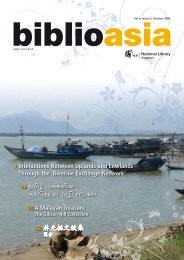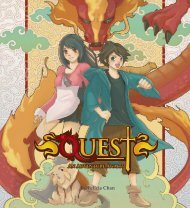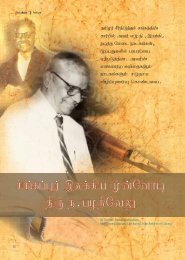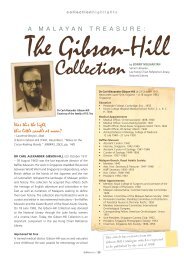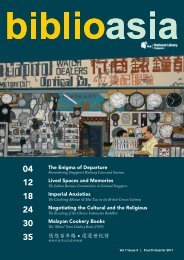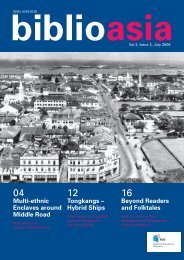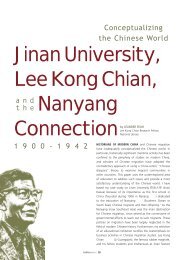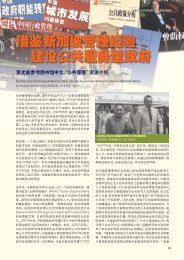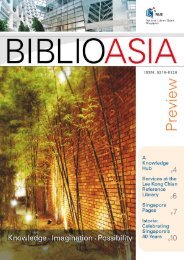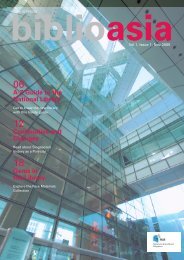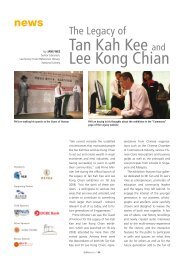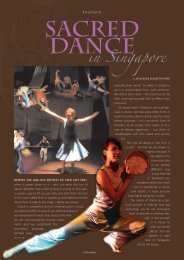Knowledge Economy: Linchpin of ASEAN Integration A View from ...
Knowledge Economy: Linchpin of ASEAN Integration A View from ...
Knowledge Economy: Linchpin of ASEAN Integration A View from ...
Create successful ePaper yourself
Turn your PDF publications into a flip-book with our unique Google optimized e-Paper software.
featureis needed to fully understand the nature <strong>of</strong> knowledge sharingbehaviour <strong>of</strong> the academic staff and students to allow us to see thedependencies that exist between other factors affecting knowledgesharing as the current study is not able to do so decisively. As itstands, it is likely that efforts in policy recommendations that attemptto alter instruction or curriculum in educational reform effort thatcould improve knowledge sharing capability in Org B will likely faceskepticism <strong>from</strong> the academic staff and students unless accompaniedby explanation about how assessment will also be altered or is not abarrier, bearing in mind that the bulk <strong>of</strong> the A-level examination is setby the external board. This recognition means thinking about howothers can get involved in producing the identities <strong>of</strong> the participantsand the value they should hold towards knowledge sharing. Thissuggests that a deeper understanding <strong>of</strong> the topic be explored tobroaden the investigation initiated by this study.All rights reserved, Sage, 1994All rights reserved, Jossey-Bass, 2001It is also interesting to note that most <strong>of</strong> the staff teaching inOrg C were mostly former students <strong>of</strong> the institutions. As such theywere feisty loyal to the school because they were brought up by thisschool and they understood what the students had gone through.DISCUSSIONTaking the insights gained <strong>from</strong> this paper, it is apparent that theacademic staff’s and students’ knowledge sharing practices varieddue to the different arrangements <strong>of</strong> the workplace/field experiencesettings as well as the differences in the ways participants madesense <strong>of</strong> their various encounters in these settings. To put them in acontinuum, Org A’s academic staff role can be seen at the extremeend <strong>of</strong> the continuum. They typically viewed their role as primarilyupholding the standards <strong>of</strong> PBL rather than realising individualpotential, with learners responsible to a far greater extent for theirown learning. It was found that Org B’s academic staff generally feltthat their primary responsibility lay with their students’ academicwelfare, with them being the guardians who were responsible for“spoon-feeding” their students through the conventional didacticlecture-tutorial approach with “testable” knowledge. This approachnevertheless, encourages the function <strong>of</strong> disseminating informationand demonstrating methods and therefore, tends to promotelearning by accumulation rather than promoting a collaborativeclimate for knowledge sharing to excel. The academic staff in OrgC meanwhile generally saw their roles as one that shifted <strong>from</strong>academic communicators to that <strong>of</strong> advisers and mentors, wheretheir tasks were to help their learners achieve the working andlearning goals that they had set out and only secondarily, to act asacademic authorities for their learners.The type <strong>of</strong> assessment structures <strong>of</strong> academic staff and thestudents’ perception <strong>of</strong> knowledge sharing practice were alsoapparent. As was seen <strong>from</strong> the findings in this study, the “taskcenteredness”and “activity-centeredness” in Org A and C requiredthe participants to draw on other learners’ diverse backgrounds,prior knowledge and networks to solve their problems. This meantthat participants needed to organise the subject matter around thetask <strong>of</strong> solving the problem and not the discipline. In this manner,significant interdependence promoted active sharing, collaboration,cooperation and coordination. Conversely, although group work waspromoted under the revised curriculum in Org B, given that the largeproportion <strong>of</strong> the assessment was still largely based on individualevaluation, with academic staff accountable to school’s ranking.This competition appeared to constrain knowledge sharing amongstudents in Org B.LIMITATIONSThis study is not without limitations. Two general caveats are worthmentioning at this point. First, it is worth highlighting that this studysought to obtain the portrayals <strong>of</strong> the academic staff and studentsin ways that revealed the “insider” rather than some external or objectivevoice. Those were unique views on the context describedand that they were no more and no less than the self-reported views<strong>of</strong> the academic staff and students who were approached for thestudy. Hence, findings <strong>from</strong> this inquiry cannot be generalised toacademic staff’s or students’ experiences in other institutions. Nevertheless,such understanding can help stimulate thoughts on thebarriers to knowledge sharing in other post-secondary educationalinstitutions with similar characteristics. Second, as this study reliedon self-report data, it may very well be that participants perceivedfactors within their control and those that showed them in a positivelight as being motivators whereas they perceived factors out <strong>of</strong>their control as opposed to factors that showed them in a negativelight as being inhibitors <strong>of</strong> knowledge sharing.IMPLICATIONSThis study provides some starting points for future research. Theexistence <strong>of</strong> differences in terms <strong>of</strong> knowledge sharing behaviour dueto the assessment method employed and its associated teaching andlearning practices across the three institutions, for example, raisesmore questions such as, which type <strong>of</strong> curriculum is desirable forknowledge sharing, given that the participants’ knowledge sharingpractices have been shown to be entangled by their institutions’representational production <strong>of</strong> what is most valued (i.e., what theassessment values).As the insights gained showed that knowledge sharing iseffectively a complex social practice, a systemic approach to researchCONCLUSIONIn this paper, I have attempted to present my rendering <strong>of</strong> the nature<strong>of</strong> knowledge sharing, grounded in the accounts <strong>of</strong> academic staffand students <strong>from</strong> three selected public post-secondary institutionsin Singapore. Documenting the thoughts <strong>of</strong> these participantsprovides a window into the complex social negotiations in operation inknowledge sharing practices in Singapore’s educational institutions.The insights found <strong>from</strong> these participants’ account <strong>from</strong> differinginstitutional types provide a good staging ground <strong>of</strong> the influenceson using student assessment in promoting/constraining knowledgesharing practices in their institutions. The insights <strong>from</strong> the studyalso provide a first small step towards understanding why knowledgesharing works for some educational institutional types, but not forothers. This could be useful in informing curriculum designers,planners and developers about the crucial enactment aspects <strong>of</strong>the curriculum and its relations to knowledge sharing practices. Thechallenge then is in creating educational institutions context thatare capable <strong>of</strong> optimally structuring the knowledge flow so thatdevelopment <strong>from</strong> knowledge sharing can occur.The author wishes to acknowledge the contributions <strong>of</strong> Dr JeanetteBopry in reviewing the paper, and Koh Kok Tin, a freelance editor,for editing the paper.references1. Bhaskaran, M., Khanna, V., & Giap, T. K.(Eds.). (2003). The first Singapore economicroundtable: September 2003. Singapore:SNP Reference.2. Cziko, G. A. (April 1989). Unpredictability andindeterminism in human behavior: argumentsand implications for educational research.Educational Researcher, 18(3), 17-25.3. Flyvbjerg, B. (2006). Five misunderstandingsabout case-study research. QualitativeInquiry, 12(2), 219-245.4. Fullan, M. (2001). Leading in a culture <strong>of</strong>change. San Francisco: Jossey-Bass.Call no.: R 371.2 FUL5. Hargreaves, D. H. (2000, March 24).Presentation by Pr<strong>of</strong>essor David Hargreaves,University <strong>of</strong> Cambridge, UK. Paperpresented at the OECD de la Muette, Paris.6.7.8.9.All rights reserved, KoganPage, 2002endnoteHargreaves, D. H. (2000). The production,mediation and use <strong>of</strong> pr<strong>of</strong>essional knowledgeamong teachers and doctors: A comparativeanalysis. In <strong>Knowledge</strong> management inthe learning society (pp. 219-238). France:Centre for educational research andinnovation, Organisation for Economic Cooperationand Development.Call no.: R BUS q658.4038 KNOHuggins, R., Izushi, H., & Davies, W. (2005).World knowledge competitiveness index2005. Wales, UK: Robert Huggins Associates.Luke, A. (2003). The future <strong>of</strong> educationalresearch: pragmatism, alignment,multidisciplinarity. The NIE Researcher, 3(1), 1-3.Ministry <strong>of</strong> Education Singapore. (2005).Statistics Digest Online. Retrieved May 8,2005 <strong>from</strong> http://sam11.moe.gov.sg/esd/.1.All rights reserved, Centre forEducational Research and Innovation,Organisation for Economic Cooperationand Development, 2000The following databases were accessed: Academic Search Premier(via EbscoHOST), Australian Education Index, British EducationIndex, ERIC (via EbscoHOST), Education Research Complete(via EbscoHOST), Singapore’s National Institute <strong>of</strong> Education’sDissertations and Theses Abstracts, ProQuest Dissertations andTheses, and ProQuest Education Journals.10. Organisation for Economic Co-operationand Development. (2000). <strong>Knowledge</strong>management in the learning society.France: Centre for educational researchand innovation, Organisation for EconomicCo-operation and Development.Call no.: R BUS q658.4038 KNO11. Sallis, E., & Jones, G. (2002). <strong>Knowledge</strong>management in education: Enhancinglearning & education. London, UK:Kogan Page.Call no.: R 370.285 SAL12. Yin, R. K. (1994). Case study research:Design and methods (2nd ed., Vol. 5).London: Sage.Call no.: RUR 300.722 YIN13. Yin, R. K. (2003). Applications <strong>of</strong> case studyresearch (2nd ed., Vol. 34). ThousandOaks: Sage.8




